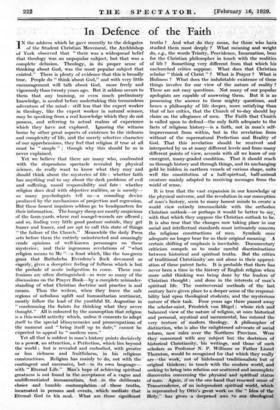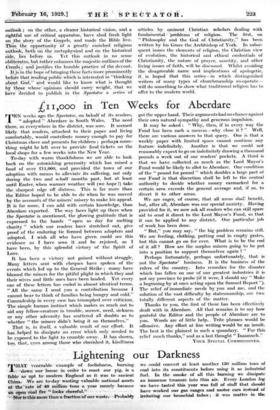In Defence of the Faith
TN the address which he. gave recently to the delegates of the Student Christian Movement, the. Archbishop of York observed that " there was a widespread belief that theology. was an unpopular Subject, but that was a complete delusion. Theology, in its proper sense of thinking about God, was the most popular subject that existed." There is plenty of evidence that this is broadly true. People do " think 'about God," and with very little encouragement. will talk about God, more freely and vigorously than twenty years ago. But it seldom occurs to them that any training, or even much preliminary knOwledge, is needed before undertaking this tremendous adventure of the mind : still less that the expert worker in theology, like the expert worker in natural science; May be speaking from a real knowledge Which they do net possess, and referring to ' actual realms Of experience Which they have not explored. Ignoring the witness borne by other' great aspeets of existence to the-richneSs and' complexity of life, 'and the merely selective character of our apprehensions, they feel that religion if true at all Must be " simple " ; though why this should be so is never explained.
" Yet we belieVe that there are many who, confronted with the Stupendous spectacle revealed by physical science, do really want to -knoW' What they may and Should think AMA the mysteries of life : whether faith has anything 'reel to say about the dark problems of evil and suffering, 'moral 'responsibility and fate : whether religion does deaf 'With objective 'realities, or is merely— as many psychologists tell iitsa consoling device produced by the mechanisms of projection and regression. BUt these honest inquirers Seldom go to headquarters for their infcirmation. The hungry sheep are mostly suspicious Of the' farm-Yarcla where real mangel-wurzels are offered ; and SO, finding very little good pasture outside; they get leaner and leaner, and are apt to call this state of things " the failure of the ChUrch." Meanwhile the Ilaily"Press sets before them the entirely uninstructed- and amazingly Crude opinions of well-knoWn personages on 'these Mysteries; and their ingenuous revelations of "what religiOn means to Me "-4 feast which, like-the too-green' grass that Bathsheba Everdene's flock devoured so eagerly; gives a deceptiVe feeling of fullrieSs which is but the prelude of acute indigestion to come. These con fessiona- it& often 'distinguished—a§ were so many of the disoussions on the Prayer Book—by a' complete inisimder- standing of 'what Christian doctrine 'and practice is and Means. Thus the writers, when they leave the safe regions 'of nebulous Uplift and humanitarian sentiment, mostly follow the lead of the youthful St. Augustine in "condemning the Saints for thinking what they never thought." All is coloured by the assumption that religion is a this-world activity which, unless-it consents to'-adapt. itself to the Special idiosyncrasies and preoccupations of the moment and " bring itself 'up to date;". cannot be expected to appeal to " modem men." • Yet all-that is noblest in man's history points decisively to a power, an attraction, a Perfection, which lies beyond the world ; but is revealed and embodied, with greater or less richness and fruitfulness, in his religious constructions. Religion has mainly to do, not with the contingent and successive, but—in its own language— with " Eternal Life." Man's hope of achieving spiritual greatness is not found in the acceptance of a vague and undifferentiated . immanentism; • but . in the deliberate choice • and 'humble contemplation of • those 'truths, incarnated in persons and events, which mediate that Eternal. God to his soul. What are those significant truths ? And what do they mean, for those who have studied them most deeply ? What meaning and weight do, e.g., the words Trinity, Providence, Incarnation, bear for the Christian philosopher in touch with the realities of life ? Something very different from that which his unchurched critics suppose. What does that Christian scholar "think of Christ " ? What is Prayer ? What is Holiness ? What does the indubitable existence of these things involve for our view of the nature of reality ? These are not easy questions. Not many of our popular apologists are capable of answering them. But it is as possessing the answer to these mighty questions, and hence a philosophy of life deeper, more satisfying than that of her critics, that the Churck of to-day should lay claim' on the allegiance of men. The Faith that Chnich is called upon to defend—the only faith adequate to the facts of religious history-'—is a faith, not in man's self- improvement from within, but in the revelation from without of the' supernatural Perfection and Reality of God. That this revelation should -be received and interpreted by us at many different levels and from many different points of view, accords with all we know of our emergent, many-graded condition. That it should reach us through history and through things, and its unchanging gold be hidden in earthern vessels of curious shape, suits well the constitution of a - half-spiritual, half-animal creature mainly adapted to receiving messages from the world of sense.
It is true that the vast expansion in our knowledge of the phyaical inn-Verge, and the revolution in our coneeptiOn otitnan's history, seem to many honest Minds- to create a World- view entirely irreconcilable with the orthodox Christian outlook—or perhaps it would be -better to say, With that which they suppose the ChriStian Outlook to' be. It is also true that -the changes noiv taking 'phtee 'in 'our social and intellectual standards must intimately concern the religious constructions Of men.' Symbols once adequate no longer bear 'for us their original ineaning. A certain .Shifting of emphasis is inevitable. Documentary criticism compels us to make careful discriminations between historical and spiritual truths. But' the critics of traditional Christianity 'arenot alone in their appreci- ation of these patent fads. It is probable that there has never been a time in the history of English religion when more solid thinking was being done by the leaders of Christian thought ; and done' in the interests of man's spiritual life. 'The controversial- methods of the last century haVe given place to a deeper "sense of the responsi- bility laid upon theolcigical students, and the mysterious nature of their task. Four years ago there passed away the'scholar-saint, Friedrich von Hugel ; whose rich and balanced view of the nature 'of religion, at once historical and personal, Mystical and sacramental, has entered the very texture of modern theology. A philosopher of distinction, who is also the enlightened advocate of social reform, now rules over the Northern Province. Were they concerned with any subject but the doctrines of historical Christianity, his writings, and those of such scholars as Professor N. P. Williams or Father Lionel Thornton, would be recognized for that which they really are—the work; not of hidebound traditionalists but of original thinkers; in touch with the modern world, and seeking to bring into relation our scattered and incomplete discoveries concerning the physical - and spiritual status of man. Again, if- on the one hand that renewed sense of Transcendence, of an independent spiritual world, which is represented by Otto's great work on the " Idea of the Holy," '- has given -a deepened awe -to- our theological outlook ; on the other, a clearer ,historical vision, and a rightful use of critical apparatus, have shed fresh light on the, story of the Gospels, and made the Bible live. . the opportunity pf a greatly enriched religious outlook, both on the metaphysical and on the historical side, lies- before Us. Yet this outlook in no sense obliterates, but rather enhances the majeStic outlines of the Creedsi.; and justifies the humble practice of the deyout. It is in the hope of bringing theie facts'more prominently before that reading public which is interested in "thinking OW GOO.," and would like to knOW what is thought by those whoSe-OpinionS shOuld carry weight, that we decided to publish in the Spectator a series of articles. by . eminent , Christian scholars dealing with fundainental -'prOblems • of religion. The first, on " Philosophy and the God of Christianity," has been written by his. Grace the Archbishop of York. In subse- quent issues the elements of religion, the Christian view of evolution, the historical and ethical credentials of Christianity, the nature of prayer, sanctity; and other hying issues of faith, will be discussed. Whilst avoiding the disagreeable name and implications of apologetic, itis hOpied that this series—in which distinguished writers of many types of churclunanship co-operate— will do something to show what traditional religion has to offer to the modern world.











































 Previous page
Previous page